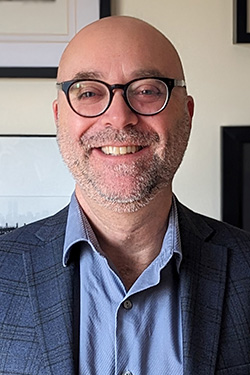
Making Statistics More Accessible
How a Professor Made an Intimidating Course More Engaging and Approachable with Open Access Materials
Aaron Kupchik, professor in the Department of Sociology and Criminal Justice, is committed to using open access materials in his courses to make them more approachable and interactive. Shortly after transitioning his research methods and statistics course to open educational resources, Kupchik was awarded an Open and Affordable Teaching Materials grant to add depth and breadth to the open materials he uses in his SOCI301 course.
Required of all sociology and criminal justice majors, many students enroll in SOCI301 reluctantly because they are intimidated by the math they will have to do. Knowing this, Kupchik is intentional about communicating clearly and effectively through engaging materials and hands-on work.
Working with librarian Alison Wessel, Kupchik identified a number of open educational resources to integrate into the course, including videos of researchers describing their methods and demonstrating how to solve statistics problems. These no-cost supplements offer guided tutorials and provide students with the opportunity to take in the same concepts from a different perspective.
Kupchik also received support from the Center for Teaching and Assessment of Learning (CTAL) and staff member Kelly Cross to revamp the course’s Canvas page. Cross redesigned the Canvas course content to enhance the flow, attractiveness and ease of use of the materials, making everything easier to find.
“[While] I was already using OER textbooks before starting this project, the additional online content helps me teach material by providing additional illustrations and examples to supplement my voice, and the improved Canvas page helps keep students engaged, informed about the supports available to them, and equipped to succeed,” Kupchik explained.
This work has helped make an intimidating course more manageable for students and allowed Kupchik to think critically about how best to teach dense concepts. He also plans to share these supplemental materials with the faculty teaching the other sections of the course to ensure more students and faculty benefit.
“I began this project as a way to fight back against the high costs to students, but discovered that it helped me to sharpen my overall approach to this course,” Kupchik said. “It has definitely been worthwhile, both to me and my students. I strongly encourage other faculty to pursue this path as well.”
For more information on sourcing and using Open Source materials, please contact the library!
